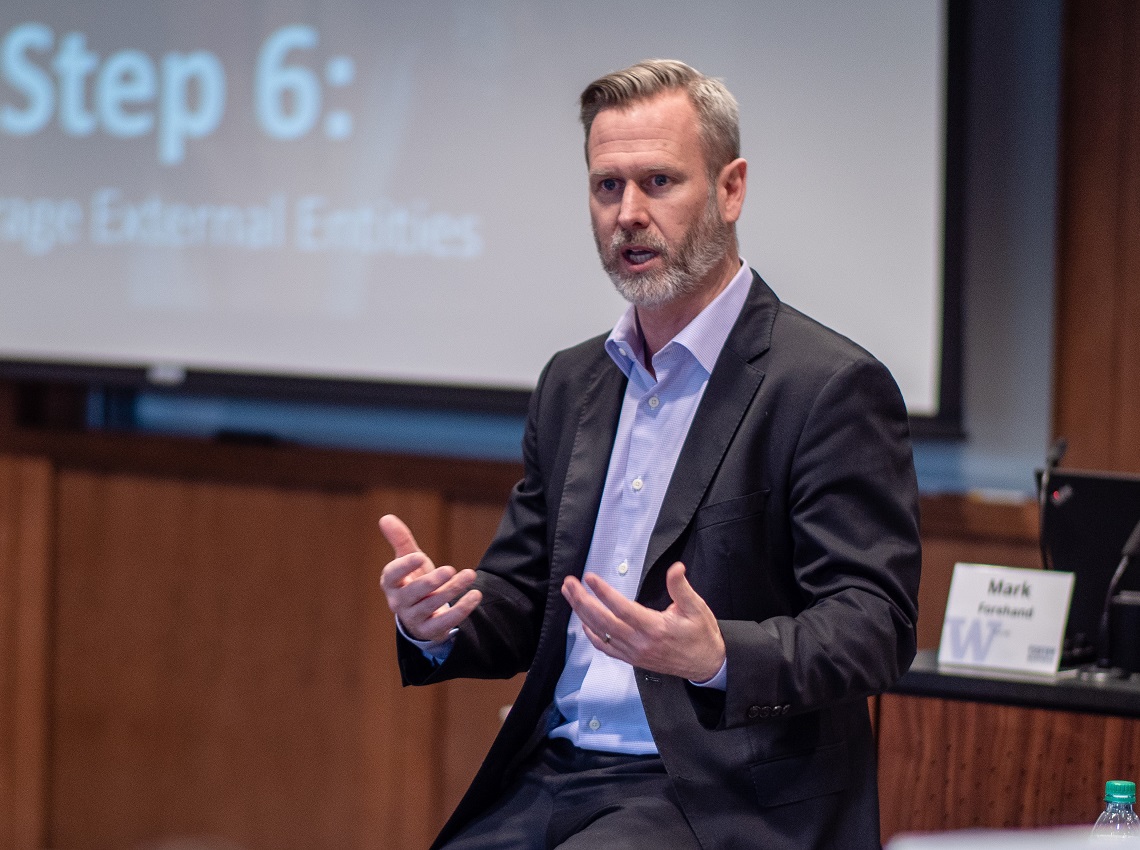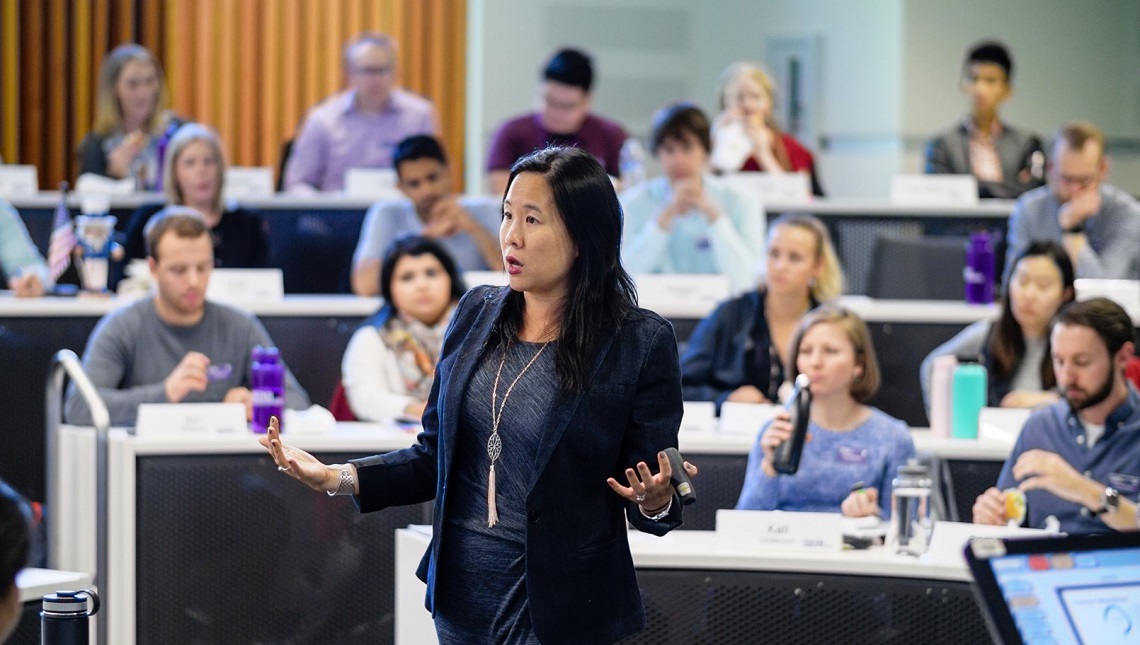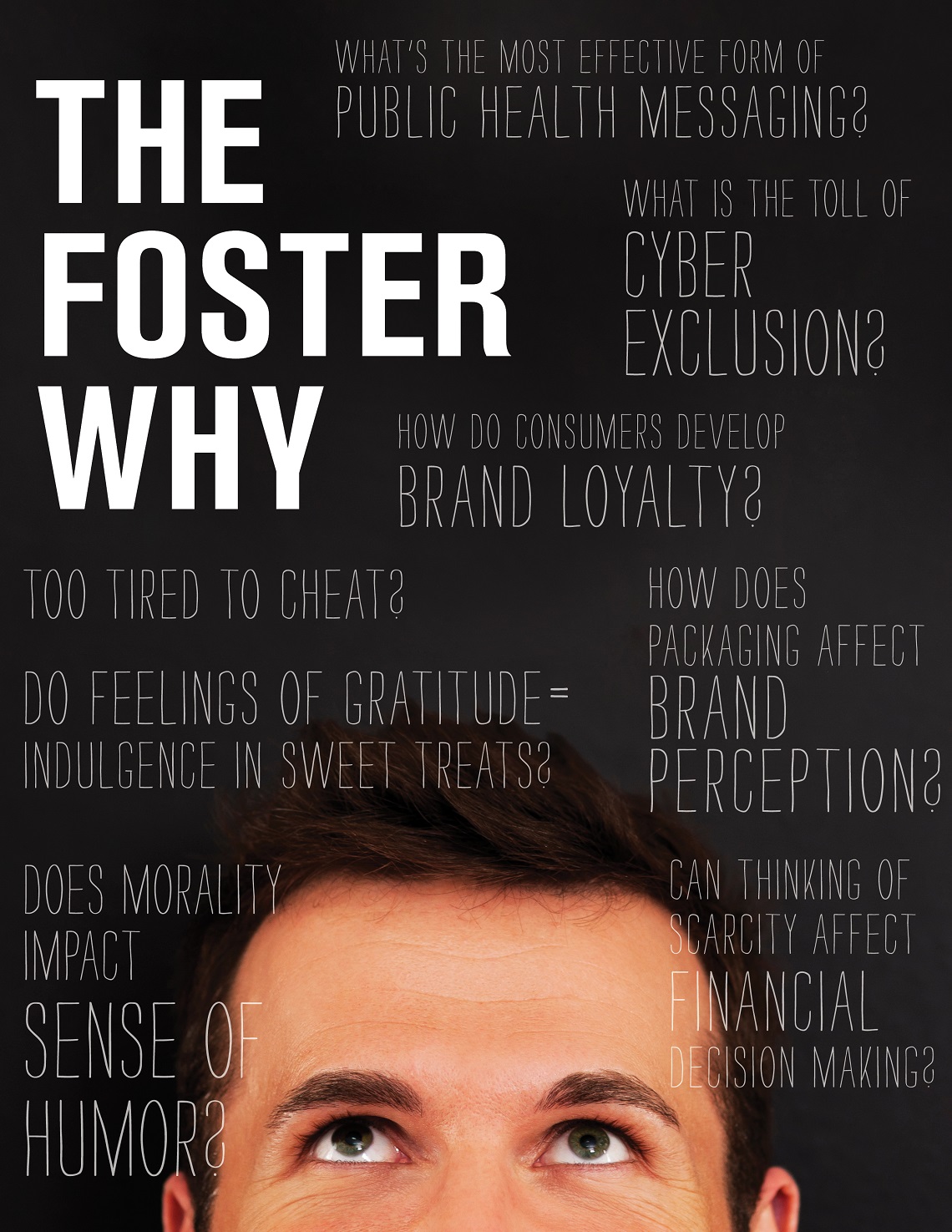The Foster Why
In the Foster School’s Behavior Lab, a remarkable collaboration of faculty and students is discovering why we do the things we do
We’re more likely to behave badly when exhausted.
This notion has become almost doctrine among ethicists, the broad conclusion of a large and convincing body of research. It follows a solid line of logic: mental fatigue depletes will power, leaving us vulnerable to the temptations of cheating, lying and stealing (and a litany of other ills).
But this reasoning has always struck Xiao-Ping Chen as missing some important context. Isn’t it possible, she wondered, to be too tired to cheat?
To find out, Chen, a professor of management and the Philip M. Condit Endowed Chair in Business Administration, Scott Reynolds, an associate professor of business ethics and Helen Moore Gerhardt Faculty Fellow, and doctoral student Kai Chi (Sam) Yam went to the Foster School’s state-of-the-art Behavior Lab to test this hypothesis on Foster undergrads.
They began by taxing the brains of their experimental group—half the participating students—with a puzzling mental exercise to identify the colors of words that spell a different color (the word blue in red type, for instance). A test confirmed the puzzles worked as planned.
Next the students read fictional reports of a poll revealing society’s view on cheating. In one, the vast majority considers low-impact cheating unacceptable; in the other, the majority gives it a pass. A test confirmed that the participants’ views were influenced by the report they had just read.
Finally, the students faced their own temptation to cheat. Each was asked to solve a series of challenging math equations and self-report their results, earning $1 for each correct answer.
What they didn’t know was that the problems were unsolvable.
Subjects, then space
Behavior studies such as this were more difficult and expensive to conduct in the days before computer labs and web-based surveys. But even today, studies of any complexity are likely to achieve conclusive findings only in a dedicated physical space.
“A traditional lab is invaluable when you are doing more involved behavioral or interactive research,” says Mark Forehand, a professor of marketing and the Pigott Family Professor in Business Administration.
When Forehand joined the Foster faculty in 1997, the only space available for behavioral experiments was the Balmer Hall computer lab. It was far from dedicated, and far from perfect.

Forehand made do. But he also began pushing for improvements to the research environment. He first tapped into a continuous source of research subjects by creating a new subject pool populated by undergraduate students enrolled in MKT 301. To gain exposure to the research process, students are given the option to participate in two behavioral studies during the quarter or complete independent research on published behavioral studies. Later, a similar pool was created for studies on the management side from students enrolled in IBUS 300.
The cohort of social scientists grew at Foster. And as the blueprints were drawn for the long-awaited PACCAR Hall, Forehand secured, at last, a dedicated space appropriate for his colleagues’ work. The Behavior Lab opened for business in fall 2010.
Behavior cave
The lab is buried deep beneath the soaring glass and vaulted walls of PACCAR Hall’s atrium and gallery, below its high-tech classrooms and tidy cloisters of faculty offices, in one of the most unassuming suites in the building.
A small sign at its entrance whispers its presence. An unadorned reception nook opens to a partitioned room aligned with computer carols. A couple of spare meeting rooms wait in the wings. There is no art on the walls. No light or sound leaks in from outside. The tone is neither sterile nor penal. Just a little bland. Nondescript. Neutral.
For a laboratory to study human behavior, it’s perfect.
“We didn’t get what most would consider an ideal space,” says Forehand. “But for a lab, it’s great. We don’t want windows. Something as simple as a sunny or cloudy day has been shown to affect how people respond. So the basement location is actually a great thing.”
Everything in the lab is designed to maximize experimental flexibility, privacy and control. “It’s a huge advantage of doing a study here,” says Ann Schlosser, an associate professor of marketing who specializes in online behavior. “It’s so much easier to get high-quality findings here, especially when you are doing a computer-mediated or online activity.”
Never a dull moment
The lab runs like a factory through the midsection of each quarter. Schlosser and Ryan Fehr, an assistant professor of management, manage their respective department’s activities, with doctoral students overseeing day-to-day operations and undergrads serving as lab assistants. Thousands of student subject hours allow dozens of studies to take place each year.
Power users include a growing cohort of Foster faculty multiplied by their doctoral students who, despite second billing, tend to be the heaviest users of all.

On the consumer behavior side, the list includes Forehand, Schlosser, Nidhi Agrawal, Shelly Jain, Richard Yalch, Jeff Shulman, Rob Palmatier, Natalie Mizik and Abhishek Borah. On the management and organization side, the usual suspects are Fehr, Chen, Reynolds, Chris Barnes, Christina Fong and Michael Johnson.
Add to the list new faculty recruits David Welsh, an assistant professor of management, and Lea Dunn, an assistant professor of marketing whose research in brand attachment, social influence and consumer emotions will fit right in. “A lot of my work involves manipulation of social interaction or emotions, which require in-person engagement,” Dunn says. “So the Behavior Lab was an important factor for my deciding to come to Foster.”
Pushing the envelope
If the Behavior Lab specializes in consumer and organizational behavior, it also serves as proving ground for studies in leadership, entrepreneurship, ethics, behavioral finance and accounting, and many more topics in the vast range of human behaviors in the context of business.
Recently Fehr studied whether moral diversity—the degree to which someone shares your same moral code—affects the level of conflict in negotiations.

A group led by Bruce Avolio, director of the Foster Center for Leadership and Strategic Thinking, is using the lab to help develop a means for organizations to valuate intangible assets such as leadership.
Team Schlosser recently investigated the effects of cyber exclusion—being left out or ignored online—on a person’s feelings. Another study, of sports drink packaging, confirmed that consumers associate an upward orientation of the logo/text with activity, and a downward orientation with rest or relaxation. A third study found that feelings of gratitude lead a person to indulge in sweet over savory treats.
Reynolds and several doctoral students have found that employees can develop a sense of moral entitlement after engaging in pro-social behavior at work.
Barnes and Yam have examined the impact of morality on sense of humor (and found them to be pretty mutually exclusive).
Lloyd Tanlu, an assistant professor of accounting, investigated how thinking about scarcity affects a person’s financial decision making.
A Borah study found that one-sided online reviews are more persuasive to people who are researching on behalf of a close friend or boss, whereas two-sided reviews work better in the lower-stakes case of researching for an acquaintance.
Chen and Suresh Kotha, faculty director of the Buerk Center for Entrepreneurship, are documenting the way people respond to different tones of entrepreneurial pitches—authentic, passionate, confidant—on crowdfunding sites.

A study guided by Fong found that the presence of emotions in the workplace decreases the likelihood that employees will be objectified and increases the likelihood of mutual support.
Mizik and her doctoral students are investigating how consumers develop loyalty to brands.
And the Agrawal group has studied the effect of different voting mechanisms on group decision making, the effectiveness of different types of public health messages on healthy eating, and how the use of causal language—“because,” “since” or “thus”—in explaining an employee’s performance ratings improves her subsequent performance.
In conclusion
In their study on fatigue and ethics, Chen, Reynolds and Yam came to a clear conclusion. The mentally depleted students who were primed to view the world as permissive of cheating proved more likely to fudge on their math scores for few bucks. But the depleted students who were primed to believe that society doesn’t tolerate cheating cheated less.
So exhaustion can actually make us less likely to act unethically when the act is complicated by a high degree of social consensus that it’s wrong. In these cases, Chen explains, mental fatigue depletes the energy required to cheat—and keep from being caught.
Additional studies confirmed this thought-provoking finding which was recently published in the journal Organizational Behavior and Human Decision Processes.
Like other successful behavioral studies out of Foster, the work contributes knowledge to the academic literature and wisdom to attentive managers.
“Periods of overwork and exhaustion are inevitable in an organization,” says Chen. “And it is at those times, when employees are most vulnerable, that a culture of integrity and honesty is essential as a deterrent to unethical acts.”
That’s one more mystery of human behavior solved by this remarkable collaboration of faculty and students at the Foster School.
But there’s always another question to be answered in the Behavior Lab.
Read about a student who turned undergraduate research at Foster into a promising academic career.

